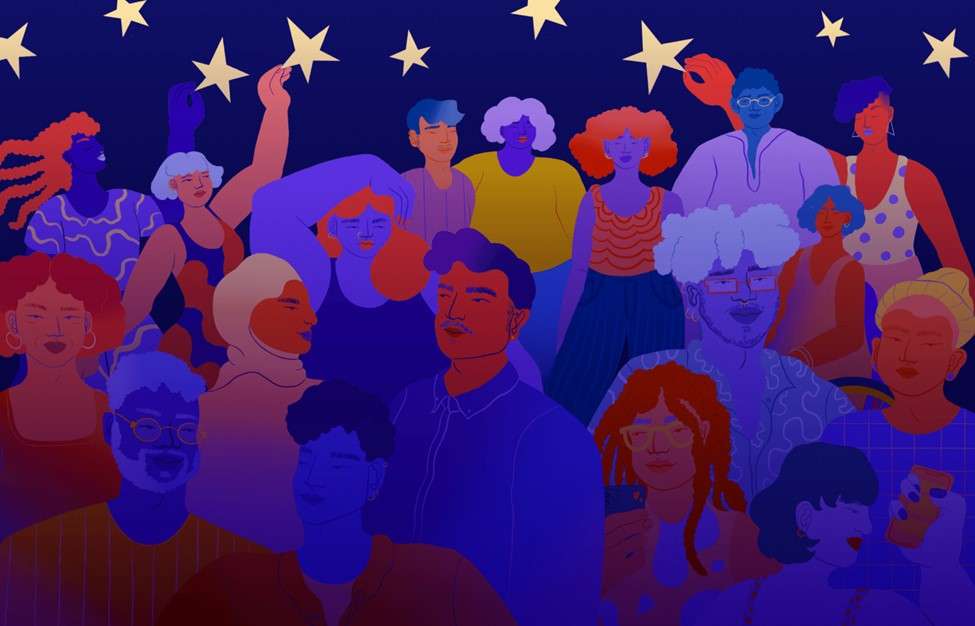
The LGBTQ community faces mental health issues that can be challenging to overcome. Stigma, discrimination, anxiety, and sadness can all result from prejudice and social depression. If you look at the LGBTQ mental health statistics in 2022, more than 2.2 million reported mental illness.
Furthermore, members of the LGBTQ community face challenges coming out to family, friends, or the workplace. The challenge can worsen mental health issues. Despite steps taken toward equality, the LGBTQ community encounters significant hurdles to getting mental health treatment.
This article will look at the LGBTQ mental issues that the community faces. It will also explain how stigma and discrimination have contributed to LGBTQ youth's mental health. Lastly, it'll look at an acceptable way to support and keep the LGBTQ community safe. Let's get started!
Table of Content
How Stigma and Discrimination Contribute to Mental Health Issues in LGBTQ Individuals
Stigma and prejudice are important contributors to LGBTQ people's mental health problems. Stigma refers to society's unfavorable and often discriminatory attitudes toward LGBTQ individuals.
Discrimination is mistreating LGBTQ persons for their sexual orientation or gender identity. Stigma and prejudice can have a severe influence on LGBTQ people's mental health in a variety of ways.
Among the possible effects are:
- Internalized Stigma
When LGBTQ people receive negative societal messages, they feel inferior, abnormal, or worthless.
- Minority Stress
Chronic stress is caused by the stigma and prejudice that LGBTQ people suffer from.
- Barriers to Health Care
LGBTQ people may endure stigma and prejudice from healthcare professionals or institutions. Then, the barrier occurs when the minority obtains or gets adequate healthcare services.
Stigma, prejudice, and the stress of coming out have caused more problems for the LGBTQ community. Anxiety, sadness, drug misuse, and suicidal thoughts are all common mental health disorders among the LGBTQ population. These problems are often caused by the obstacles LGBTQ people encounter. The reasons include societal stigma, discrimination, and the stress of coming out to family and friends.
Common Mental Health Challenges Faced by LGBTQ Community
The LGBTQ community confronts unique problems and pressures because of societal stigma, discrimination, and violence. Therefore, they are more exposed than the average population to mental health issues.
Some of the most frequent mental health issues that LGBTQ people face are:
Anxiety
Anxiety is a state of uneasiness, concern, or dread that impairs everyday functioning. They may endure rejection, harassment, or violence from others or internalized stigma or shame over their identity. Consequently, a large part of LGBTQ people suffers anxiety. Anxiety symptoms include a racing heart, sweat, shaking, shortness of breath, and panic attacks.
Depression
Depression is a mood illness characterized by chronic sorrow, despair, or lack of interest in activities. LGBTQ community may go through depression because of isolation, lack of family or friends support, etc. Low energy, sleeplessness, eating changes, and suicidal thoughts are all indicators of depression.
Substance Abuse
It refers to overusing alcohol or narcotics to deal with stress, emotions, or suffering. LGBTQ people can use narcotics to escape their issues, dull their sensations, or blend in with others. Substance misuse can result in health issues such as liver damage, overdoses, and addiction.
Eating Disorder
These are disorders characterized by problematic eating habits such as bingeing, purging, restricting, or obsessing about food or weight. The reason is LGBTQ people owing to body dissatisfaction, poor self-esteem, or pressure to adhere to cultural expectations of beauty or masculinity. Eating disorders can induce malnutrition, dehydration, electrolyte imbalance, and heart failure.
These mental health issues can influence LGBTQ people's well-being and quality of life. If you are battling these concerns, seeking treatment and support from professional and peer sources is essential.
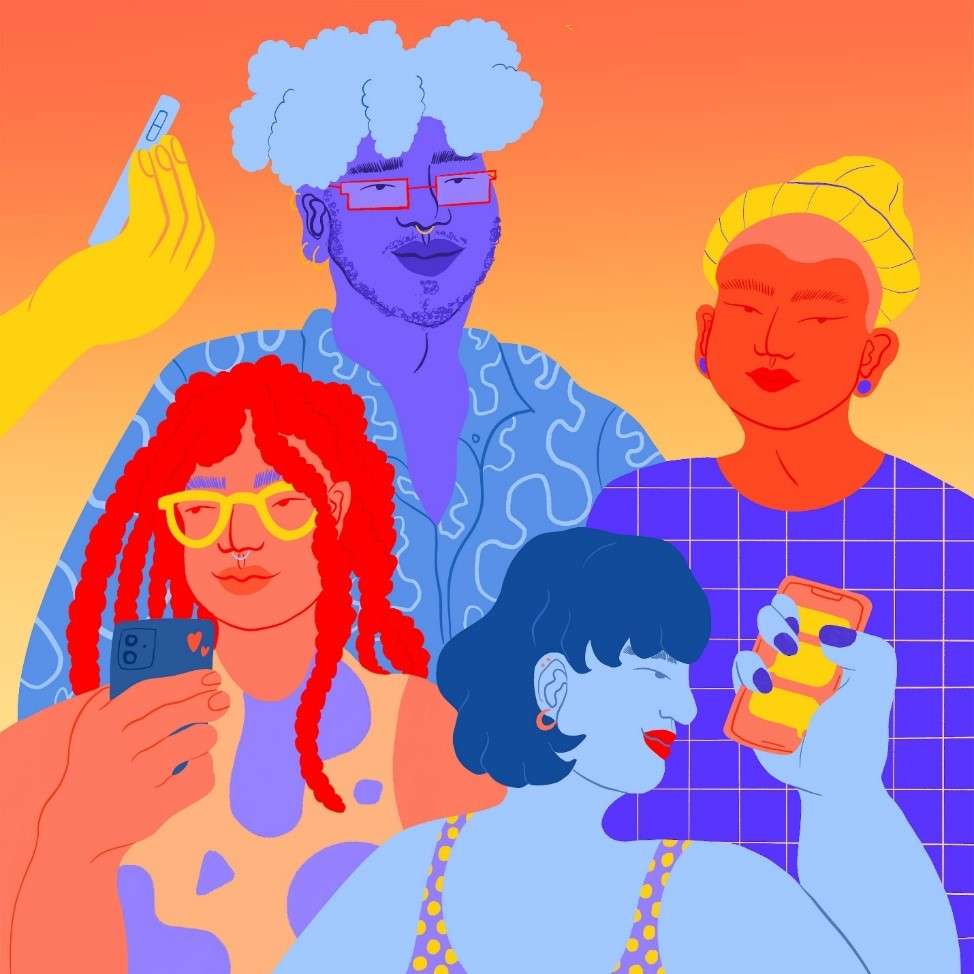
Ways You Can Support People and Family Who Identify as LGBTQ
Individuals who identify as LGBTQ, as well as their families, can benefit much from your support. Here are some typical methods to show your support for LGBTQ individuals in your community:
Common Ways To Support LGBTQ People Around You
Let's look at some of the easy-to-implement ways in which you can help the LGBTQ community:
Treat Them Like You Would Anyone Else
This entails acknowledging that LGBTQ persons are characterized by their personality, interests, beliefs, and objectives rather than their sexual orientation or gender identity. They, like you, are human beings with emotions, aspirations, and dreams.
Please don't base your conclusions or judgments on preconceptions or falsehoods about them. Because of their identification, please do not treat them differently or exclude them from events or discussions.
In addition, ensure not to correct or pressure them to meet your standards. Instead, treat them with love, compassion, and respect, and acknowledge and appreciate their differences.
Respect Boundaries
Respecting LGBTQ people's privacy and autonomy and allowing them to choose how and when to communicate their identification with others is vital. Don't expose them without their permission or push them to come out before they're ready.
Please don't ask them questions about their personal lives or bodies that you wouldn't ask anybody else. Make no unpleasant or harmful remarks or jokes about them. Don't discount or discredit their sentiments or experiences. Instead, please pay attention to them and encourage them when they open up to you.
Use Appropriate Language
Start using the appropriate language around LGBTQ persons to define them and their community. Using slurs, insults, or pejorative language damaging or abusive to LGBTQ individuals is prohibited.
Don't use obsolete or erroneous terminology that is untrue or derogatory to LGBTQ persons. Use language that minimizes or dismisses the diversity and complexities of LGBTQ identities and manifestations.
Please educate yourself on the language and ideas used by LGBTQ persons to describe them and their community. Use uplifting, inclusive language recognizing and respecting LGBTQ people's identities and experiences.
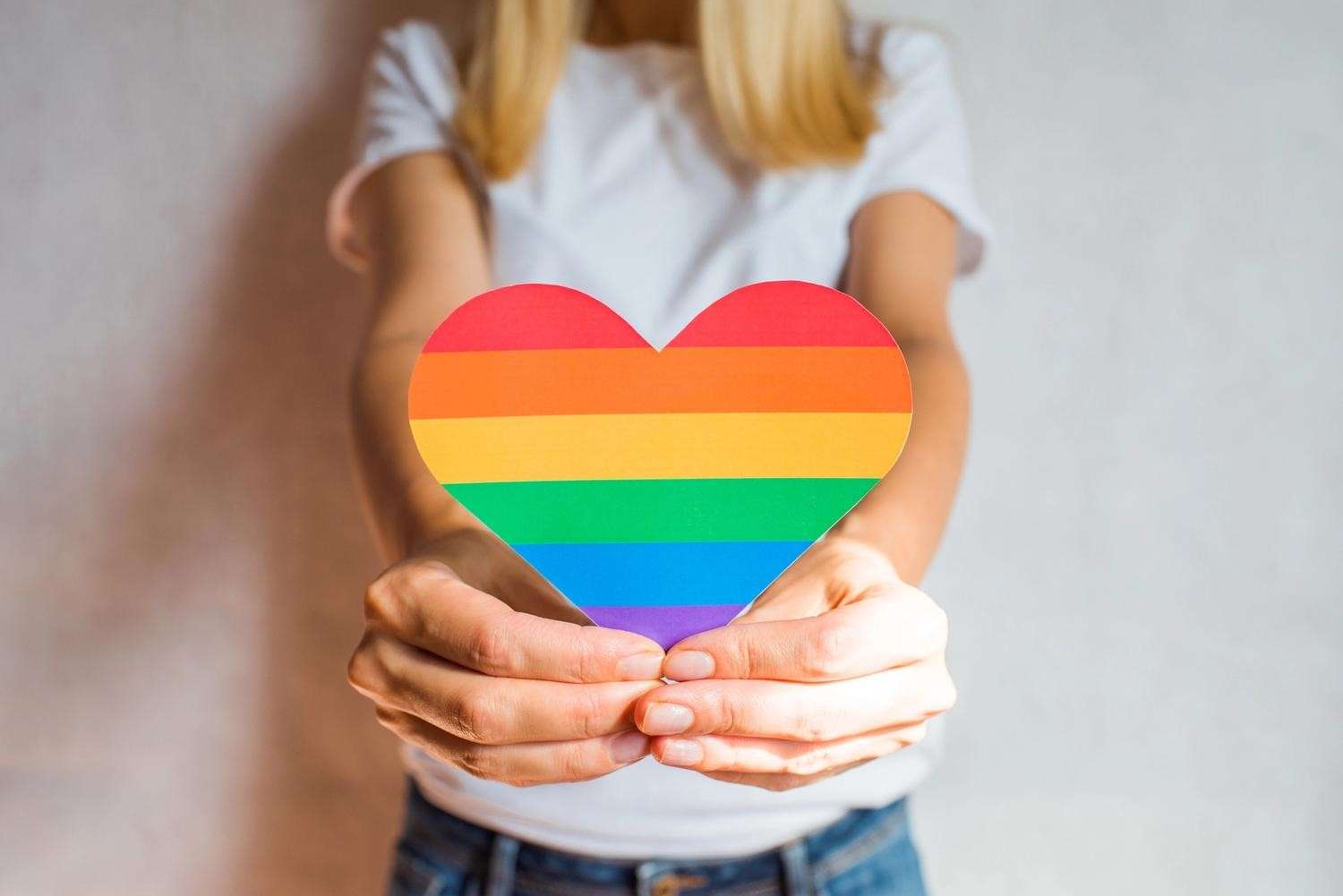
Safeguard Your Loved Ones With FamiSafe
Wondershare FamiSafe is an app that allows parents to monitor and safeguard their children's internet activity. It contains several features that can help parents protect their children from internet risks such as cyberbullying, inappropriate content, predators, and fraud.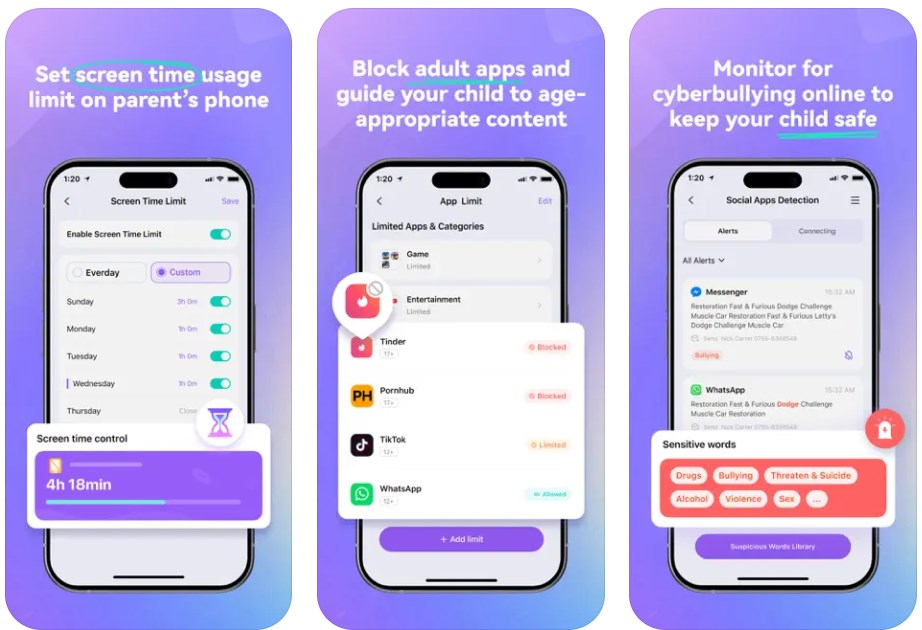
Key Features of FamiSafe
The following are some of the critical features of FamiSafe:
- Restrict the time children spend on smartphones.
- Certain applications, websites, and activities can be blocked from children's devices.
- Parents can constantly monitor their children's location,
- Block inappropriate content from their children's devices.
Pros
The following are some of the pros of FamiSafe:
- Easy to install and use
- The user-friendly interface reduces the learning curve
- Gives parents control over their loved ones' life
- 24/7 live tracking on offer
- Extremely easy to filter the harmful content
Cons
The following is the con of FamiSafe:
- Consumes too much battery life
- The free trial period only lasts three days
Explicit Content Detection feature
The Explicit Content Detection feature can help parents detect and block any explicit or dangerous content their LGBTQ children can see on social media platforms like WhatsApp, Facebook, Instagram, YouTube, or TikTok. It can notify parents if their LGBTQ children send or receive texts containing unpleasant or abusive words, phrases, or emojis.
In addition, this function can help parents in protecting their LGBTQ children from potentially dangerous internet content, such as cyberbullying, which can have a detrimental influence on their mental health and well-being. Parents can also tailor the keywords and categories they wish to track and filter based on their children's ages and needs.
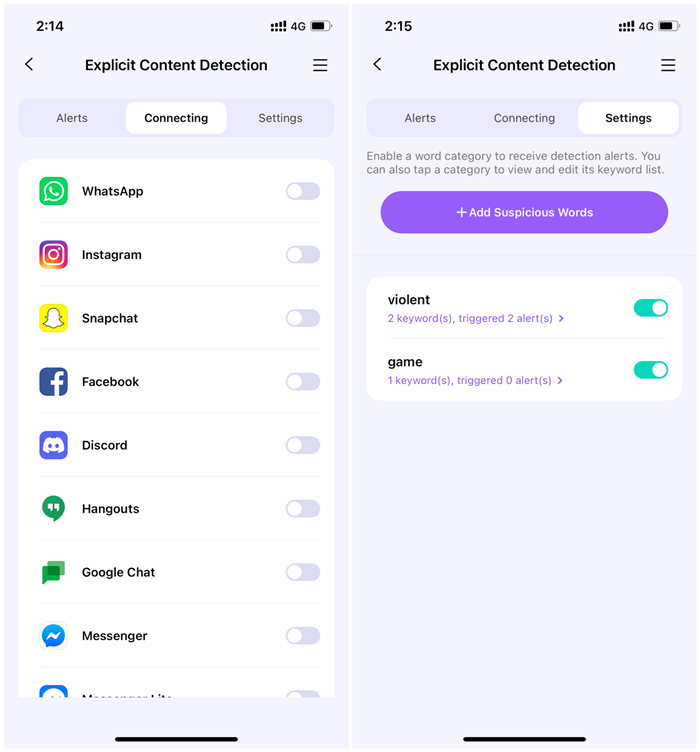
Live Location feature
The Live Location feature using GPS technology can help parents track and locate their children's real-time position. It can also reveal their children's gadgets' location history and battery condition.
With real-time location monitoring, this function can help parents assure their LGBTQ children's safety and security in an emergency or a risk. Parents can also set geofences and get notifications when their LGBTQ children enter or depart certain places, such as school, home, or a park.
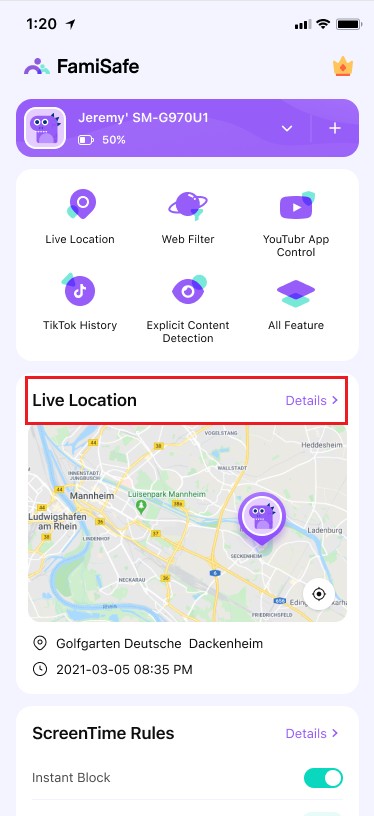
Conclusion
LGBTQ people experience substantial mental health difficulties. Giving them help and building a safe and inclusive atmosphere is important. It is essential to acknowledge and address the detrimental effect of stigma and prejudice on LGBTQ people's mental health. A more supportive world can be created by fostering acceptance, respect, and understanding.
FamiSafe is one approach to protecting your loved ones. FamiSafe's primary features, such as Explicit Content Detection and Live Location, can help parents. It assists them in protecting their LGBTQ children from dangerous online information, such as cyberbullying, and safeguards their loved ones via real-time location monitoring.
